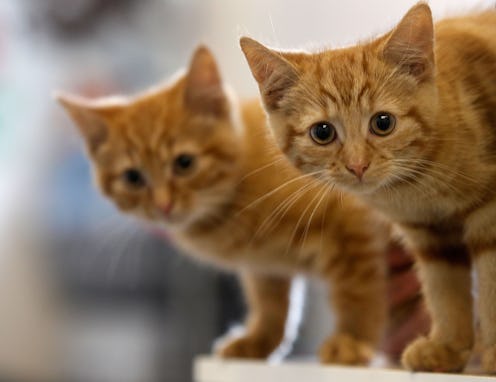
Cats might have a reputation for being aloof, but that doesn’t mean they don’t ever express how they’re feeling. So what happens when you, say, bring another pet home with you? Do cats get jealous in situations like this? And if so, how might they express it? The answer is a little complicated — but, as is always the case with pets, the key to figuring out what’s going on is paying attention to your furry pal’s behavior.
According to most experts, it’s not really known whether cats and other pets experience jealousy in the way that humans do for the simple reason that the cats themselves can’t use their words to tell us about it. As animal behaviorist Suzanne Hetts said according to PetMD, “We have no idea whether a pet’s emotional state is equivalent to what people label as jealousy.” The kind of behavior humans might chalk up to jealousy is often more about competition than anything else — according to Hetts, it’s a situation “where the pet is competing with another individual — human, dog, cat, or otherwise — for something it wants.”
Indeed, this sort of behavior is a survival instinct, particularly for cats. As Catster puts it, “in nature, what drives cats to rival one another is scarce resources, such as food and clean water” — that is, “it’s not jealous, but competition for finite resources.” That’s why domesticated cats can get territorial over things like their food bowls or the favorite places to sleep — they’re protecting what they need access to in order to survive. And humans? We’re domesticated cats’ primary resource: We provide food, shelter, care, and affection. As such, cats don’t always want to share us — with other cats, with other pets, or even with other humans.
When cats are feeling competitive, they might behave in any number of ways, according to pet-centric site Cuteness. Some cats might be a little overtly aggressive, growling, hissing, or even swatting at what they perceive as their rivals; others, however, might display more avoidance-related behaviors, such as refusing to eat or spending all their time hiding. Still others might get clingy, climbing all over you and constantly demanding your attention. It’s also not uncommon for cats in competition to pee in places other than their litter box, either out of anxiety or as a way to mark their territory, or to become a bit more destructive than they typically are.
This kind of competitive spirit and behavior can be brought on by any number of things, but most commonly, it’s due to the introduction of someone or something new into the cat’s life: A new pet, a new baby, or even new people can interrupt your cat’s routine and cause them to become territorial. However, as registered veterinary technician Renae Hamrick noted over at PetPlace, it’s important to make sure that, if these behaviors develop, they are, in fact, because of competition or rivalry, not an underlying health problem. If it’s not immediately clear why your cat is suddenly hiding a lot or peeing in strange places, definitely take them to the vet to get checked out.
Once you have determined that the behavior is a result of your cat’s emotional state, rather than their physical health, there are a few ways you can deal with it. For one thing, keep giving your cat love and attention, and try to keep its schedule as close to its regular routine as possible. Make sure that the resources your cat is most likely to feel territorial about — food, water, toys, etc. — are plentiful. And if you’ve just brought home a new pet, don’t let the newcomer take over your cat’s food, toys, bedding, or other supplies; ensure that your cat’s own things remain their things. It might cut down on how threatened they feel by the new arrival.
To help get your cat used to a new pet that’s joining your household, veterinarian Dr. Courtney Campbell detailed a simple technique on the television program The Doctors back in 2015: “One technique to do is to put … [both] pets in a separate room — preferably a room where they can smell each other under the door — and then, after about 30 minutes, switch rooms,” said Dr. Campbell. “That way, they kind of know that the other one’s there — they’re getting adjusted to it by smell.” In this way, said Dr. Campbell, you can help your cat get out of what he called “the red zone” — the emotional state in which your cat feels extremely anxious about something new happening in their world.
Of course, it’s also worth noting that at least one study has found that one type of domesticated pet might experience jealous in the human sense: In 2014, researchers from the University of California, San Diego found that dogs display jealous behavior when their humans showed affection toward a toy dog capable of mimicking barking, whining, and tail-wagging. The real dogs didn’t just growl and snap at the toy dog; they also physically tried to insert themselves between the toy dog and their humans. The researchers believe their results “lend support to the hypothesis that jealousy has some ‘primordial’ form that exists in human infants and in at least one other social species besides human.”
Dogs aren’t cats, of course, but it’s not out of the question that cats might display similar behavior in similar situations. Further research would be required to explore that idea more fully. But even if cats don’t get jealous in the human sense the way dogs might, it’s still worth checking up on your furry pal and doing what you can to help them feel more comfortable in a stressful situation. A little extra love and attention can go a long way.